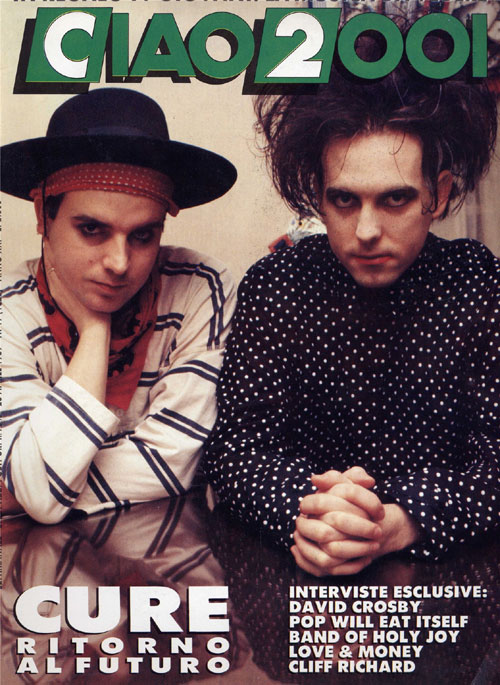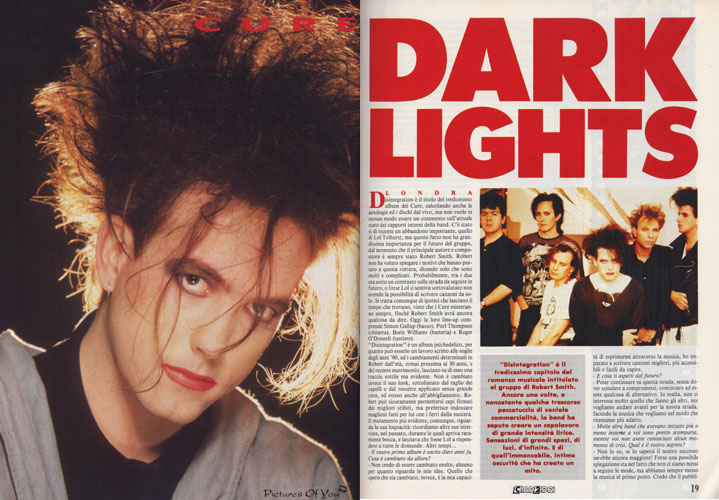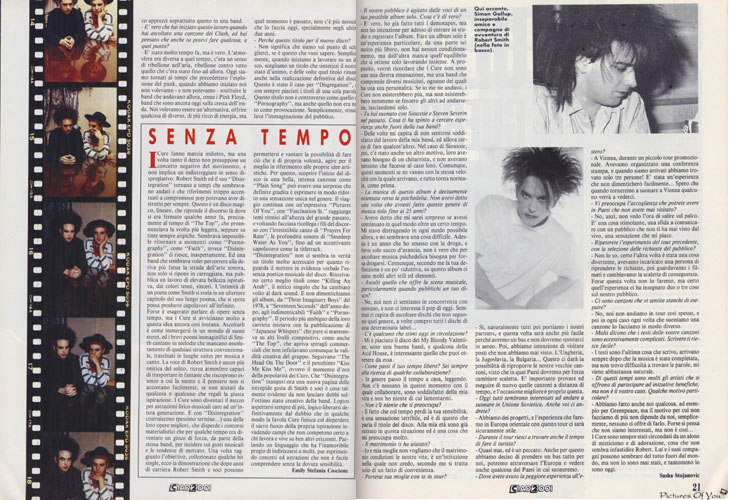April 1989 - CIAO 2001 (Italy)
(Translation Below)*
"Dark Lights" (4page -
Interview)



DARK LIGHTS
London 3/1989
"Disintegration" is the title of the 13th album by The Cure (including compilations and live disks), but it is in no way a comment on the current state of the band. Recently there's been an important departure, that of Lol Tolhurst; but this doesn't have a lot of importance for the future of the group since the principal author and composer has always been Robert Smith. Robert didn't want to explain the reasons for this break, saying only that the reasons are many and complicated. There was probably a disagreement on future paths or perhaps Lol felt undervalued not being able to write songs on his own.
But these are speculations that will sort themselves in time since The Cure will continue to exist as long as Robert Smith has something to say. Today the lineup includes Simon Gallup (bass), Porl Thompson (guitar), Boris Williams (drums) and Roger O'Donnell (keyboards).
"Disintegration" is a psychedelic album, at least as much as an album can be at the edge of the 90s, with changes in Robert's age (now close to 30) and his recent marriage leaving subtle but evident traces. But his look hasn't changed, evident by his haircut, messy lipstick extending to his clothes. Robert can surely afford designer clothes by the best designers, but he prefers to wear sweaters knit by his mother- in-law. The most evident change, though, is his talkativeness. We remember past interviews where he barely opened his mouth and left Lol to answer all the questions -- the old days...
Q: Your first album came out 10 years ago. What's happened since then?
A: I don't think a lot has changed, at least with my ideas. What I hope has changed is my ability to express myself through music. I've learned to write better songs -- more accessible and easy to understand.
Q: What do you expect in the future?
A: To be able to continue this way, without having to compromise, continuing to do something different. We're really not much interested in what others are doing, we want to continue on our path making the music that we want in the way we think best.
Q: Many bands that began more or less at the same time as you quickly disappeared while you've suffered no crisis. What's your secret?
A: I don't know -- if I knew, our success would be greater! Maybe the answer is that we didn't start following trends but we always put the music first. I believe the public appreciates that in a band.
Q: Is it true that everything began when you heard a song by the Clash and at that point you thought you could do the same thing?
A: It was a long time ago, but it's true. The atmosphere was different at that time; there was a sense of rebellion then -- rebellion against everything that had existed before. Today we've returned to the times before the punk explosion. When we started out we didn't want -- and we couldn't -- replace the bands of that time like Pink Floyd that even today are on top. We wanted to be a change, something different with more energy; but that moment has passed -- there's no one that's doing it today -- especially over the last two years.
Q: Why this title for your new album?
A: It doesn't mean that we're breaking up, if that's what you want to know. It simply means that when we begin working on an album we pick a title that synthesizes how we feel and sometimes that title stays until the album is completed. That's what happened with "Disintegration". I've always liked one-word titles. This title isn't controversial like "Pornography", but even that one wasn't meant to provoke. It simply sparked the public's imagination.
Q: Your fans are agitated by talk of a possible solo album. Is there any truth to this?
A: It's true, I've already done all the demo tapes, but for now, I don't intend to go in the studio and record. Making a solo album is an odd experience -- on one hand you have more freedom, on the other you lack that balance you get from working together. By the way, I would like to point out that The Cure doesn't come only from me but from a band consisting of different musicians, each with his own personality.
If I left, the Cure wouldn't exist any more; but it also wouldn't exist if everyone else left.
Q: You played with Siouxsie and Steven Severin in the past. What caused you to pursue these experiences outside your band?
A: Sometimes it happens that I don't feel satisfied by the band's work and then I try to do something else. In Siouxsie's case there was another reason: they needed a guitarist and no one else was quite right for them. But these moments pass as soon as they come and everything goes back to normal.
Q: This album is decidedly psychedelic. Didn't you once say that you would do this kind of music only until you were 25?
A: I said that I would be surprised if I continue with it beyond a certain time. I was destroying myself in every possible way then, and it seemed difficult to me. It's been a year now that I've stopped doing drugs and I only drink orange juice, but it's not true that you have to do drugs to listen to psychedelic music. But I think your definition is a little narrow -- there are lots of other elements and styles on this album.
Q: Do you listen to the current music scene -- especially when you're doing a new album?
A: No, we don't feel we're competing with anyone and we're not interested in today's pop music. If anything we listen to records that aren't of that type -- sometimes I buy all the records from a particular label.
Q: Is there anyone out there you like now?
A: I liked the record by "My Bloody Valentine" -- they're a good band, and something by Acid House; it's interesting what you can get out of that.
Q: How do you spend your free time? Are you still looking for collaborators?
A: Most of the time I'm at home, reading. There's no one at this moment I would like to collaborate with -- I'm happy with my life and have no complaints.
Q: Nothing's worrying you?
A: The fact that with time you lose your sensitivity -- it's a terrible feeling: that's what the title of the album is about. At my age I'm already there and it worries me a lot.
Q: Has marriage helped?
A: My wife and I don't want our marriage to change our life. It's an institution I don't believe in; for me it's just a fact of convenience.
Q: Will you bring your wife on tour?
A: Yes, we all bring our partners. And this time it will be even easier because we'll have a bus and we won't have to fly. And we plan to visit places we've never been before: Hungary, Yugoslavia, Bulgaria.
This will give us a chance to play some old songs again since we'll have to change playlists in those countries. It's important to try and play those older songs and what better chance than this?
Q: Today everyone seems interested in playing the Soviet Union. Will you go there, too?
A: We have some plans and our experience in Eastern Europe with this tour will surely be helpful.
Q: During a tour do you manage to find the time to sightsee?
A: Almost never and it's too bad. That's also why we decided to take a bus just for us -- we could pass through Europe and also see something of the countries we'll play in.
Q: Where did you have the worst experience abroad?
A: in Vienna during a small promotional tour. We had organized a press conference and when we arrived we found only 3 people! It was an experience I won't easily forget. I hope that when we go back to play in Vienna someone will come to see us.
Q: Do you worry about the welcome you'll have in the countries you've never visited?
A: No, on the contrary, I can't wait to go on stage. It's exciting -- a challenge to communicate with a public that you've never seen live -- a feeling I like.
Q: Will you repeat your experiment from the previous tour where you took requests from the audience?
A: I don't know. certainly it was fun last time. We had hired someone to take requests then we looked at the clips and we changed playlist as a result. Maybe we won't do it this time but that experience taught us a thing or two about our audience.
Q: Are there songs you're tired of playing?
A: No, we don't go on tour that often and we play a song differently each time anyway.
Q: Many say your lyrics are too complex. Is it easy for you to write?
A: The lyrics are the last thing I write. They always come after the music is finished, but I don't have a problem finding the words; they come to me rather easily.
Q: Many artists these days participate in benefits or charities, but you don't. Any particular reason?
A: We have done something; for Greenpeace, for example. But the reason we don't do it more doesn't depend on us -- no one asks us to. Perhaps they don't think we're interested, but that's not true.
The Cure have always been surrounded by mystery and adoration -- something that doesn't bother Robert. He and his bandmates may seem completely out of this world, but they never have been and are even less so today.
BOX TITLE: "Timeless"
The Cure are taking a step back, but for once the saying doesn't imply a negative sense of motion or a derogatory movement backwards. Robert Smith and his "Disintegration" goes back to times that seemed long gone and that heavy references and pop compromises could have destroyed forever. This is a magical record, linear, that takes the conversation back to where it stopped at the time of "The Top", that heralded the lighter turn, albeit with atypical shades of color. It seemed impossible to return to moments like "Pornography" and "Faith", but "Disintegration" does it unexpectedly. And a band that seemed to want to drift along the most fatuous path of sound not only puts itself back on the road but publishes a work of heightened inspired beauty with tenuous, sincere colors. The intimacy of a poet like Smith is revealed in a later chapter of his long poem that one hopes can produce masterpieces indefinitely.
Perhaps it exaggerates to say "timeless", but The Cure come close.
Listening to them is like immersing oneself in a world of ethereal sounds and Smith's short imaginative poems sing in melodies that lack any conventional structure, dragged in long suites for music and voice. Robert Smith's voice is even more dream-like than usual, creating an atmosphere capable of transporting one's imagination to rediscover essences that the mind and thought are not easily brought to if not helped by something or someone that gives the right inspiration. The Cure have become the means for lyrical-musical abstractions dear to an entire generation. And with "Disintegration"
they build (bad term) one of their best works, one that disperses the materialistic edges that had become a power play on the part of the band for a while to influence music and the market. With the goal achieved and the hit singles collected, here's the proof to Robert Smith and associates' claim that they can allow themselves to do what they want, doing their best according to their artistic ideals. To say that finding a beautiful, intense song like "Plain Song" at the beginning of the record a pleasant surprise is to diminish a unique sensation. The trip continues with an expressive "Pictures of You", "Fascination Street", and reaches rhythmic themes at the level of its great past and turning back, reconnects the threads of the conversation with the irresistible song "Prayers for Rain", the deep sounds of "Same Deep Water as You" to the captivating masterpiece of the title track.
We don't believe "Disintegration" to be a very accurate title for describing the poetic musical essence of the record. Better titles are "Killing an Arab", the mythical single that changed the face of dark sound. And let's not forget the albums from "Three Imaginary Boys" (1978) to "Seventeen Seconds" one year later to the unforgettable "Faith" and "Pornography". The most ambiguous period of their career began with "Japanese Whispers" which maintained high standards of composition as did "The Top", that contained commercial glimpses but didn't affect the creative status of the group. "The Head on the Door" followed by the penultimate "Kiss Me Kiss Me" -- the golden age of popularity for The Cure. It is evident that "Disintegration" begins a new page of the fearless exploits of Smith and associates, leaving no doubts as to the creative state of the band. It's logical to always expect more, logical to rid oneself once and for all of the doubt that the Cure fairy tale could end, dispersing the sacred fires of their own inspiration by going in directions that certainly don't belong to those who work and live on a completely different level. A language that has the unwavering gift of speaking to many while expressing concepts and abstractions that aren't easy to understand without the requisite sensitivity.
Inset page 1: "Disintegration" is the thirteenth chapter of the musical novel written by Robert Smith's group. Once again, and in spite of small transgressions of venial commercialism, the band has created a masterpiece of great lyrical intensity. Feelings of great spaces, light, the infinite. It's that unfailing, intimate darkness that created the myth.
Caption on 3rd page: Here, Simon Gallup, inseparable friend and buddy of Robert Smith ( in photo below).
Thanks so much
BETH
for TRANSLATING.